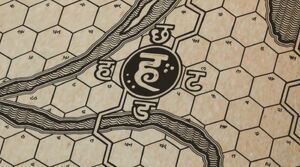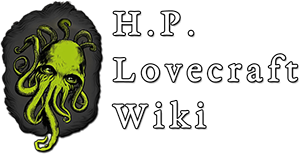
As depicted in Batman: The Doom That Came to Gotham.
![]()
![]()
![]() Aklo is a fictional language, first mentioned by Arthur Machen (ADJ: "The White People") and incorporated into the Cthulhu Mythos by H. P. Lovecraft in "The Dunwich Horror" and "The Diary of Alonzo Typer".
Aklo is a fictional language, first mentioned by Arthur Machen (ADJ: "The White People") and incorporated into the Cthulhu Mythos by H. P. Lovecraft in "The Dunwich Horror" and "The Diary of Alonzo Typer".
It appears as a key element of Alan Moore's Mythos work The Courtyard and his comic book series Providence.
The White People[]
In Arthur Machen's "The White People", a girl's journal includes the passage:
I must not write down the real names of the days and months which I found out a year ago, nor the way to make the Aklo letters, or the Chian language, or the great beautiful Circles, nor the Mao Games, nor the chief songs. I may write something about all these things but not the way to do them, for peculiar reasons.
In Lovecraft's Fiction[]
Lovecraft's "The Dunwich Horror" (1928) includes a quotation from Wilbur Whateley's journal:
Today learned the Aklo for the Sabaoth...which did not like, it being answerable from the hill and not from the air.... I wonder how I shall look when the earth is cleared and there are no earth beings on it. He that came with the Aklo Sabaoth said I may be transfigured, there being much of outside to work on.
After Robert Blake, the protagonist of "The Haunter of the Dark" (1935), discovers a cipher in the abandoned Starry Wisdom Church, he finds that the text is "in the dark Aklo language used by certain cults of evil antiquity, and known to him in a halting way through previous researches.
Aklo comes up repeatedly in the revision tale "The Diary of Alonzo Typer" (1938). First Typer notes that a presence in the Van der Heyl house "towers like a colossus, bearing out what is said in the Aklo writings." Then he writes, "Later I ascended to the attic, where I found several chests of strange books—many of utterly alien aspect in letters and in physical form alike. One contained variants of the Aklo formulae which I had never known to exist." Finally, referring to the presences in the house, he writes, "I know now that the third Aklo ritual—which I found in that book in the attic yesterday—would make such beings solid and visible."
Description[]
The Aklo language and script was first used by the Serpent Men some 1.5 million years ago, during the Pleistocene epoch. To this day the Aklo language is still employed in certain spells and rituals.
Usage[]
Although Aklo can be used for communication, its primary usage is in incantations and prayers. Below is a list of some of the magical rites that Aklo is employed in.
Aklo Unveilings[]
- The Aklo Unveilings are a collection of 48 revelations recorded by the Aklo. There is said to be a 49th Unveiling, which mankind will only learn when Glaaki calls humanity to him.
Aklo Formulae[]
- The Aklo Formulae are a collection of incantations connected with the summoning, banishing and controlling of certain extradimensional beings. The Third Aklo Formula can be used to make invisible and immaterial entities reveal their physical form.
Examples[]
Since the Aklo language is still in use today, certain cultists and sorcerers may have records and codices in this language. One of the best known public records of the Aklo language is the Unaussprechlichen Kulten which contains a key to deciphering the Aklo lettering system and a rudimentary dictionary. The Aklo Tablets (also known as Aklo Writings or the Aklo Book) appear reproduced in the book Remnants of Lost Empires.
It is actually Aqlo in Hali's Booke, it contains 24 letters and is written right to left. Its name is transcribed as Olqa in English, which is said Aqlo, and it is "the gossamer of speaking which conceals the thing itself". Hali learned it from star-headed beings through a black mirror. (EXP: Providence) It is described as Ur-syntax, the primal vocabulary. (EXP: The Courtyard)
- Anh-Ohd, which is said Dho-Nha, is Aklo for "that intrusive force whose entry inflicts a new significance" (EXP: Providence) also known as Dho-na meaning "a force which defines; lends significance to its receptacle as with the hand in the glove; wind in mill-vanes, the guest or the trespasser crossing a threshold and giving it meaning" (EXP: The Courtyard) or (EXP: Providence)
- Yr Nhhgr is Aklo. (EXP: The Courtyard) Rgnhhn Ry, which is said Yr Nhhngr, is "the now that is before" or "the future that contains the now that contains the before" and also described as a tense denoting "nested time". (EXP: Providence)
- Ia, or Iä
- "Ph'nglui mglw'nafh Cthulhu R'lyeh wgah'nagl fhtagn" (In his house in R'lyeh, dead Cthulhu waits dreaming) (HPL: "The Call of Cthulhu") is Aklo. (EXP: The Courtyard) Ngathv, which is said Fhtagn, is the act "that which dreams itself" or "that which is its own dream of itself" and Iulgn'hp, said Ph'nglui, is "an immersion of that which is itself more forcefully immersive" or "the ocean hidden in the puddle". (EXP: Providence)
- Ia'Y-Azv, which is said Wza Y'Ei, is "the vast unspoken negtion that words bring, as though an absent shadow" (EXP: Providence) also known as Wza-Y'ei, a word for "the negative conceptual space left surrounding a positive concept, the class of things larger than thought, being what thought excludes" (EXP: The Courtyard) or (EXP: Providence)
- yh'naghu or yh'nak'hu. (EXP: Providence)
- Chanolog'y, which is said Y'golonac, is "the inviolable rule that rules for its own violation". (EXP: The Courtyard, Providence)
- Ogthrod Ai'F Geb'L-Ee'H Yog-Sothoth 'Ngah'Ng Ai'Y Zhro (HPL: The Case of Charles Dexter Ward) is Aklo. (EXP: Providence)
- Agnadiuorp, which should be read Prouidanga is Aklo. (EXP: Providence)
- "Yog-Sothoth Ngh'Haa Ygnaiith Fthagn" (EXP: The Courtyard)
- "R'lyeh Nga'haa Tekeli-li" (EXP: The Courtyard)
- "Ylyl Yr Nhhngr" seems to mean "now is before" (EXP: Providence)

